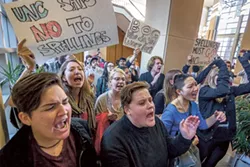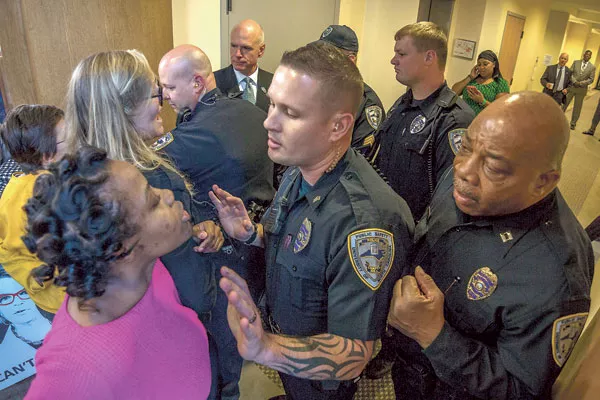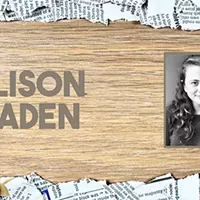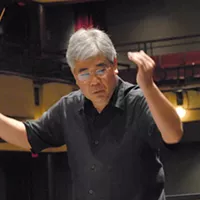Students protest appointment of new system president
Check your Spellings
By Ryan Pitkin @pitkin_ryanStudents, faculty members and concerned residents converged on Chapel Hill from all parts of the state on Friday to voice concerns with the October appointment of Margaret Spellings – whose record on education, social issues and profiting from student loan debt is problematic for some – as president of the University of North Carolina system, and they were clearly heard.
Nearly 100 protesters stood inside the UNC Chapel Hill Center for School Leadership Development, just down the hall from a room in which the UNC Board of Governors was meeting. According to those inside the meeting, the chants and cheers of those protesters — blocked from the hallway by three to five police officers throughout the morning — were heard loud and clear.
Meanwhile, inside the meeting, seven activists spoke directly to board members, standing up during the board's roll call and voicing their disagreement with the board's appointment of Spellings in October.
One by one, the seven activists stood and began reading statements. Most were cut off before they could finish, and as each person was escorted out by police while chanting "Spellings must go," the next would stand and begin their statement. The seven people were brought to a separate room and made to sign a statement admitting to trespassing before being banned from the building, but not arrested.
Harry Phillips, who was a high school teacher in Durham before becoming an instructor at Central Piedmont Community College in Charlotte for 15 years, was one of the seven escorted out by police on Friday. He said he was inspired by the diversity in age, race and all demographics among those who showed up to have their voices heard at the meeting.
"My colleagues — the other six folks with whom I was detained — I feel a very strong solidarity with them. There was some faculty, a student, a retired person and representatives of the community," Phillips said. "We were a good group. We really felt motivated to step up. It's that time in the history of our state; it's that historical moment where the forces of restraint and control and discrimination and exclusivity need to be challenged aggressively."
The choice to place Spellings at the head of the UNC system has angered people for a list of reasons. Among them are her strong anti-gay stance and spearheading of support for President George W. Bush's No Child Left Behind Act while serving as Bush's Secretary of Education. No Child Left Behind was effectively overturned by President Obama's Every Student Succeeds Act on the day before Friday's Board of Governor's meeting.
But the issue that weighed heaviest on protesters' minds on Friday was Spellings' involvement with predatory student loan companies and her support for the corporatization of colleges and universities. As Secretary of Education, Spellings formed the Commission on the Future of Higher Education — often referred to as the Spellings Commission — which called on colleges and universities to focus more on training students for the workplace.
After serving in the department of education, Spellings went on to work in the for-profit college industry, serving on the board of Apollo Group, the parent company of for-profit chain University of Phoenix, and later chaired the board of student-loan collection agency the Ceannate Corporation. She later told the Board of Governors that these experiences helped her to think of students "as customers in providing a product."
For Phillips, it's this attitude that makes Spellings dangerous to higher learning in North Carolina.
"There is such great danger there when you have corporate values replacing the values of intellectual inquiry and open-minded thinking," Phillips says. "When you shape the way people think, and you shape the way a generation of students thinks and sees the world, some of those folks will be working in decision-making capacities and will make decisions based on what they know and how they see the world. If it's through a corporate lens then many people will be excluded and that's what happening now. We're seeing that in North Carolina with our right-wing legislature openly discriminating against many poor people, people in need of healthcare, student workers and labor in general."
These issues were enough to bring protesters young and old to Chapel Hill on Friday, despite the fact that the meeting was held at 8 a.m. on a Friday during finals week.
Alex Jutila, an undergrad student at UNC Charlotte, woke up at 4 a.m. to make the drive despite a looming 35-page paper due in one of his history classes. He said a 19-percent salary raise awarded to UNC Charlotte Chancellor Philip Dubois in October, despite faculty and staff receiving just a $750 one-time bonus and no raise, angered him.
Dubois could not be reached for comment on the raise or Friday's meeting in time for Creative Loafing's press deadline.
Noe Pliego Campos, another UNC Charlotte student who rallied with protesters outside the meeting, said the raises, also awarded to 11 other chancellors in the UNC system, are another example of how schools are misspending money while ignoring faculty and students in liberal arts or other less profitable fields. He fears Spellings, who begins her tenure as UNC president on March 1, 2016, will only add to that profit-driven climate.
"UNC Charlotte has been going on a track where they only support STEM and business degrees that capitalism can exploit. The humanities, they're the ones facing the brunt of privatization and using universities as money-makers as opposed to places where people go to learn and to critically think about their surroundings and the social political moments they're existing in," Campos says. "That's what's happening at UNC Charlotte as a whole; that we're moving toward this whole thing where you go to STEM so you can be an engineer and make a lot of money, or go into business so you can exploit people in the future."
While protesters inside the meeting were escorted out one by one, those outside were loud but peaceful. At one point, things got tense when some students near the front tried to budge past campus police to enter the meeting, at which time one officer pulled his taser, keeping it pointed toward the ceiling and telling protesters, "You're not going in there."
Cop with taser drawn after students try to get thru and into meeting #SpellCheck pic.twitter.com/QENRPNGxH2
— Ryan Pitkin (@pitkin_ryan) December 11, 2015Ashley Williams, a graduate student at UNC Charlotte, spent the night in Chapel Hill to make sure she'd be present and ready for Friday's meeting. She said she was motivated by the presence of educators who traveled to Chapel Hill to be there on Friday. Professors and faculty from schools across the state, ranging from East Carolina University to Appalachian State University, were among those loudly chanting and disrupting the meeting on Friday.
"I was especially excited to see faculty members from other schools. It made me realize how much work we have to do in Charlotte in terms of getting our faculty involved," Williams says. "The work we've been doing on campus in Charlotte has shown that a lot of faculty members are afraid to come out, so I'm hoping that things like this are going to help us mobilize, and we're going to take the energy back."
Dr. Michael Behrent, assistant professor of history at Appalachian State, was among those escorted from the meeting after standing to state his concerns. He said he was happy to have enough time to state his university while the school's chancellor, Dr. Sheri Everts, sat just feet away.
"She was probably proud of me," he said later in the parking lot of the building he had just been banned from for life.
While it's unclear what Everts thought of the protests, some board members were not happy with the noise and disruption.
Dr. Jarvis Hall, associate professor of political science at North Carolina Central University who was inside the meeting, said he was bothered to hear board members Steven B. Long and W. Marty Kotis III suggest that chancellors discipline disruptive faculty members involved with the protests.
"They were complaining about the faculty members who were in there earlier and whatever they did to disrupt the meeting and that they should be disciplined," Hall says. "I'm not sure what that means in regards to freedom of speech and academic freedom. That will send a chilling effect throughout the faculty if that kind of thing is heard. From my perspective, that's trying to make sure that democracy doesn't spill into the kinds of things that they're doing in there."
Board chair Louis Bissette Jr. later told reporters he doesn't believe anyone will face disciplinary action in connection with the action.
Once the board went into a closed meeting, protesters disbanded, but not before promising to continue to rally against Spellings' appointment, including at a protest planned for the next Board of Governors meeting at North Carolina A&T State University in Greensboro on January 22.
"We're just going to take the energy back," Williams said on Friday before heading back to Charlotte. "We're going to keep getting fired up and asking people to come out. We're going to try to get even more students to come back with us in January."
Speaking of...
Latest in News Feature
More by Ryan Pitkin
-
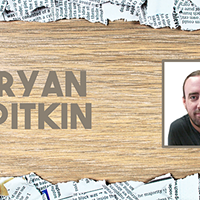
You're the Best... of Charlotte
Oct 27, 2018 -
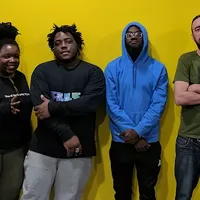
Listen Up: Cuzo Key and FLLS Go 'Universal' on 'Local Vibes'
Oct 25, 2018 -

Listen Up: KANG is Back and Bla/Alt on 'Local Vibes'
Oct 18, 2018 - More »

